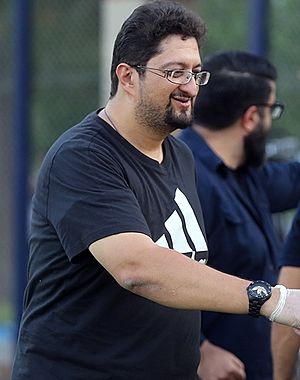Human Afazeli facts for kids
 |
|||
| Personal information | |||
|---|---|---|---|
| Date of birth | 3 September 1971 | ||
| Place of birth | Tehran, Iran | ||
| Youth career | |||
| 1983–1984 | Rah Ahan | ||
| 1984–1988 | Pas | ||
| Senior career* | |||
| Years | Team | Apps | (Gls) |
| 1988–1991 | Pas | ||
| Managerial career | |||
| 2000–2001 | Pas U18 | ||
| 2001–2002 | Shahab Zanjan U21 | ||
| 2002–2005 | Shahab Zanjan | ||
| 2002–2006 | Iran (assistant) | ||
| 2007–2008 | Saipa (assistant) | ||
| 2008–2009 | Iran (assistant) | ||
| 2010–2011 | Iran U-23 | ||
| 2011–2012 | Steel Azin | ||
| 2014 | Iran U-23 (caretaker) | ||
| 2017–2018 | Saba Qom | ||
| 2018 | Naft Tehran | ||
| 2018–2019 | Karun Arvand | ||
| 2019–2020 | Pars Jonoubi | ||
| 2020 | Machine Sazi | ||
| *Club domestic league appearances and goals | |||
Human Afazeli (Persian: هومن افاضلی) is a well-known Iranian football coach and a former player. He was born on September 3, 1971, in Tehran, Iran. After his playing career ended early due to an injury, he became a successful coach for various teams, including the Iranian national team.
Contents
Human Afazeli's Playing Days
Human Afazeli started playing football when he was young. He joined a team called Rah Ahan F.C. in Iran. Later, in 1984, he moved to Pas F.C.. By 1988, he joined the main Pas F.C. team. He was with them for three seasons. Sadly, his playing career ended early in 1991 when he was just 20 years old, because of a knee injury.
Coaching Career Highlights
After his playing career ended, Human Afazeli became a football coach at the age of 25. His first main coaching job was with Shahab Zanjan, a team in Iran's first division.
New Football Strategies
During his three years with Shahab Zanjan, Afazeli introduced new ways of playing. He used formations like 4-2-3-1 and 4-4-2, which meant having four defenders in a straight line. This was different from what most Iranian teams did at the time, as they usually played with a 3-5-2 formation.
Working with the National Team
Afazeli's smart ideas and coaching skills were noticed. After a friendly match between the Iran national team and Shahab Zanjan, Iran's head coach, Miroslav Ciro Blazevic, invited Afazeli to join the national team. He became a technical adviser and analyst.
Afazeli continued to work with the national team for four more years, even after Ciro Blazevic left. He worked with the new coach, Branko Ivanković. During this time, he helped the team achieve great things:
- They won a gold medal at the 2002 Asian Games.
- They finished third in the 2004 AFC Asian Cup.
- They played in the 2006 FIFA World Cup.
He was part of more than 100 international matches as an assistant and analyst for the national team. He returned to the national team in 2008 to work with the new coach, Ali Daei.
Challenges and New Roles
Afazeli left the national team in April 2009 after Ali Daei was no longer the coach. After a few months, he became a senior member of the technical committee for the Iran Football Federation. He wanted to be a head coach again.
In 2011, he became the head coach of the Iran U23 team. His goal was to help the team qualify for the Olympic football tournament in London. He successfully led the team to the next round after a play-off match against Kyrgyzstan. However, Afazeli resigned right after the second match. He said it was because he felt there wasn't enough support from the Iranian Olympic Committee and the Football Federation of Iran.
On June 27, 2011, he was appointed head coach of Steel Azin. The team was doing well and was close to being promoted to the top league. However, FIFA decided to take away 12 points from the club because of an issue with a former coach. On February 17, 2012, Steel Azin and Afazeli decided to go their separate ways due to different ideas.
Return to U23 Team
On September 20, 2013, the Iranian Football Federation appointed Afazeli as the technical director for the Iran national under-23 football team. His job was to oversee the team's progress and plans for the upcoming Asian Championship in Oman.
He later became the manager of the team after the previous manager resigned. Many players were not released by their clubs, so Afazeli had to take a second team to the tournament in January 2014 in Oman. They went without much preparation or friendly matches, with only 19 players. They drew 3–3 with Japan in their first match, lost 1–0 to Australia in an exciting game, and beat Kuwait 3–1 in their last game. They did not qualify for the next stage, missing out only by goal difference.

